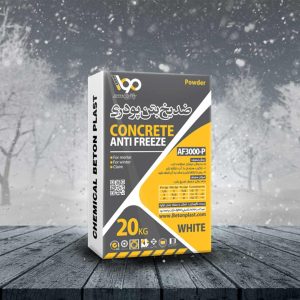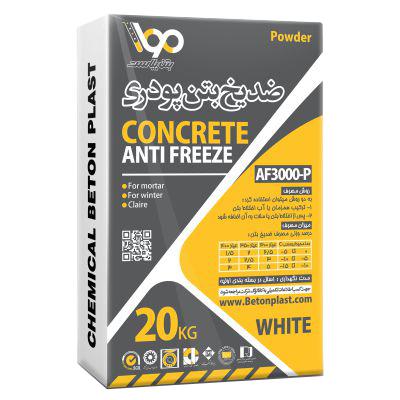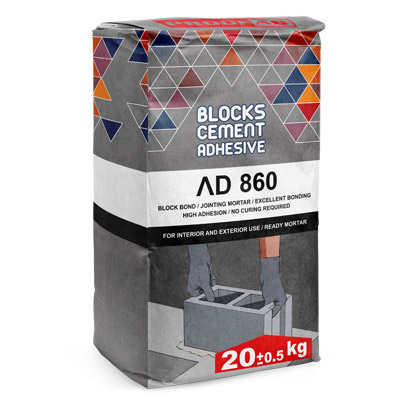Mortar anti freeze
Description
Description: Mortar anti freeze
Mortar anti freeze is a suitable additive based on calcium chlorides and mineral salts that is formulated and provided to reduce the freezing point of mortar and concrete, accelerate the heat retention and heat intensity, which is combined with special ratios for concreting in cold weather.

Features:
- Increase the speed of concrete and mortar hardening
- Increasing the thermogenesis of concrete and providing early initial resistance
- Reduce the freezing point of water and concrete
Applications:
- Ability to use in cold and freezing areas
- Provides quick concrete grip for quick use of concrete structure
- Can be used in unreinforced concrete due to chloride ion
Technical specification table:
| Appearance | Powder |
| Color | White |
| Specific gravity | 2/1 gr/cm3 |
| Standard | ASTM C494
EN 934-2 |
| PH | 7 |
| Chlorine ion | Doesn’t have |
Package:
20kg bag
Product Description – Mortar Powder Antifreeze
Freezing of concrete and mortar and subsequent thawing of frozen concrete after hardening is always one of the important problems regarding the stability of concrete. It is imperative to consider the prevention of freezing of fresh concrete as well as the conditions of concreting in cold weather. Powdered antifreeze admixture for mortar is a suitable additive based on calcium chlorides and mineral salts to lower the freezing point of mortar and concrete, accelerate setting and intensify heat generation, which is formulated, produced and offered in specific proportions for concreting in cold weather. Due to the presence of chlorine ions in the concrete antifreeze formulation, it is not recommended for use in reinforced concrete.
Antifreeze powder mortar is specially used in cement mortars and unreinforced concrete. It should be explained that in concreting or mortaring conditions in cold weather, if the concrete or mortar that has not yet reached its initial setting freezes based on the cold air, it will cause the total volume of the concrete or mortar to increase, and eventually freeze, which will occur as a result of the freezing of the mixed water. In the reflection of freezing of concrete, because the amount of water that should have reacted in the hydration process is frozen, it will delay the setting and hardening of the concrete. Until the ambient temperature decreases, the setting process will not occur. (Note that after the frozen water in the mixture melts, the concrete must be vibrated again.) In this case, the expansion that occurs during freezing will cause the concrete and mortar to set with a large volume of pores in the mixture, which will also disrupt the desired strength, and we will naturally witness a drop in strength. Therefore, if the freezing of the concrete occurs before it sets and acquires the necessary initial durability, serious damage will be caused to the concrete, but if this freezing occurs after it sets and acquires the desired initial strength, the concrete will have greater tolerance to freezing.
Mortar antifreeze powder is an essential additive in the cold weather construction industry. Cement antifreeze is a type of cement accelerator in powder form. When added to ready-mixed or traditional cement mortars, it accelerates their mechanical strength at low temperatures, reduces setting time, and prevents freezing during early concrete ages.
Mortar powder antifreeze packaging
20 kg bag
Maintenance of mortar powder antifreeze
Duration: One year in original packaging.
Conditions: Away from cold and frost, heat and direct and prolonged sunlight.
Best storage temperature: +10 to +30 degrees
Consumption of powdered antifreeze for mortar
The amount of powder antifreeze used in mortar depends on the coldness of the ambient air during concreting and 8 to 12 hours after concreting, as well as the grade of concrete. Therefore, the prediction of ambient temperature changes should always be taken into account in order to accurately select the amount to be used. Normally, the weight percentage of powder antifreeze used in mortar is calculated based on the weight of cement used in various grades of concrete according to the table below.
The weight of cement used in different grades of concrete is calculated according to the table below.
| 300 carat | Carat 350 | Carat 400 | |
| Up to 5- | 5/2 | 2 | 5/1 |
| Up to 10- | 3 | 5/2 | 2 |
| Up to 15- | 5 | 4 | 3 |
How to use powdered antifreeze for mortar
- The amount of powdered antifreeze mortar calculated according to the grade of concrete should be diluted with 2 times the volume of concrete mixing water. The diluted additive should be gradually added to the concrete while it is being mixed.
- This product can be added to the ready-mixed concrete and after complete mixing, concreting can be carried out.
Note: It is recommended to mix for at least 1 minute per cubic meter of concrete.
Properties and effects of powdered antifreeze for mortar
- Increasing the heat generation of concrete
- Increasing the cohesion and durability of concrete and mortar against frost
- Increasing the speed of setting and hardening of concrete and mortar
- Early provision of initial resistance
Applications of mortar powder antifreeze
- Suitable for making cement mortar in cold and frosty climates
- Suitable for producing prefabricated concrete parts
- Suitable for making and applying concrete in cold and frosty areas.
- Suitable for concrete construction and application in situations where a rapid drop in ambient temperature is expected.
- Efficiency in unreinforced concrete due to the presence of chloride ions
- Fast setting of concrete for quick use of concrete structures
Physical and chemical properties of mortar powder antifreeze
| Title | Feature |
| Mode | Powder |
| Color | White |
| Specific gravity | 2/1gr/cm3 |
| Chlorine ion | Yes |
| PH | About 7 |
Mechanism of action of mortar powder antifreeze
For concrete or mortar to set, it is necessary for cement and water to react so that the concrete hardens and reaches the required strength. The hydration process of cement and water will be significantly slowed down at temperatures below 5 degrees Celsius. The chemical additive of the mortar, powdered antifreeze, accelerates the hydration stages, which are an exothermic reaction, and if the setting stages are controlled and balanced, the freezing of concrete can be prevented by adding powdered antifreeze. Concrete antifreeze includes two other products, including liquid concrete antifreeze with chloride and liquid concrete antifreeze without chloride.
Safety of antifreeze powder mortar
- This material is not considered toxic, flammable, or environmentally hazardous.
- If your eyes get contaminated, rinse them with cold water.
- In case of contact with skin or eyes, wash with plenty of fresh water.
- If swallowed, seek medical attention immediately.
Standard antifreeze powder mortar
ASTM C494 – BS EN 934 standard






Reviews
There are no reviews yet.